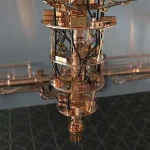Quantum News Briefs: March 13, 2024: SemiQon announces successful testing and global shipping of its silicon-based 4-qubit quantum chip and ground-breaking transistors; Deloitte Launches Its Quantum Climate Challenge 2024; IMS Developing Japan’s First “Cold Neutral Atom” Quantum Computers: New Collaboration with 10 Industry Partners toward Commercialization; IBM agreement boosts USC’s quantum computing leadership; University of Rochester secures federal funding to enable advanced quantum research; and MORE!

Quantum News Briefs: March 13, 2024:
SemiQon announces successful testing and global shipping of its silicon-based 4-qubit quantum chip and ground-breaking transistors
![]()
SemiQon, a Finnish startup, has taken a significant step forward in quantum computing by successfully producing a 4-qubit quantum dot array, marking a crucial milestone in its efforts to facilitate the development of stable logical qubits. Manufactured in Espoo, Finland, these chips are now distributed to key partners worldwide to spur further research and innovation. To tackle complex problems in fields such as pharmaceuticals, logistics, and material science, SemiQon aims to accelerate the transition towards more powerful quantum computing. CEO Dr. Himadri Majumdar highlighted the importance of merging semiconductor technology with quantum computing, leveraging existing infrastructures to pave the way toward quantum supremacy. This achievement also underscores SemiQon’s strategic approach of integrating classical and quantum elements at cryogenic temperatures, with the recent development of low-noise, fully-depleted silicon-on-insulator metal-on-semiconductor (FDSOI-MOS) transistors. These advancements will be detailed in a forthcoming peer-reviewed scientific article and will be further discussed at the Quantum.tech USA event in Washington DC, April 2024.
Deloitte Launches Its Quantum Climate Challenge 2024
![]()
Deloitte is launching its annual Quantum Climate Challenge, a unique initiative designed to bridge the gap between quantum computing and climate science to tackle urgent climate change issues. This year’s challenge, focusing on applying Quantum Machine Learning (QML) to enhance flood forecasting along the Wupper River in Germany, aims to improve climate resilience by advancing disaster prediction methods amidst the increasing volatility of our climate. Participants are tasked with developing quantum models for next-day flood predictions and conceptualizing approaches for utilizing quantum or hybrid methods for more complex problem-solving in the future. Collaborating with leading hardware providers, the challenge offers participants access to cutting-edge technology and the opportunity to present their solutions to an expert panel, competing for a prize pool €12,000. The initiative underscores Deloitte’s commitment to fostering innovative solutions to climate-related challenges through the convergence of interdisciplinary expertise.
IMS Developing Japan’s First “Cold Neutral Atom” Quantum Computers: New Collaboration with 10 Industry Partners toward Commercialization
![]()
Japan’s Institute for Molecular Science (IMS), National Institutes of Natural Sciences, has launched a Commercialization Preparatory Platform (PF) to fast-track the development of innovative quantum computers, a move inspired by Prof. Kenji Ohmori’s research group’s achievements. This initiative, supported by a collaboration with 10 industry partners, including leading companies and financial institutions like blueqat Inc., Fujitsu Limited, and NEC Corporation, aims to expedite the commercialization process, including start-up establishment and development of domestically produced quantum computers. The IMS plans to introduce a startup by the end of FY2024 to develop “cold (neutral) atom” quantum computers, distinguished by their operation at room temperature and their potential to overcome quantum computing’s current scalability and error-correction challenges. Prof. Ohmori’s group leads the field with breakthroughs in “optical tweezers” and “ultrafast two-qubit gates,” significantly enhancing quantum computing’s efficiency and reliability. This collaboration signifies a strategic effort to position Japan at the forefront of quantum computing innovation, with significant economic and technological implications.
IBM agreement boosts USC’s quantum computing leadership
![]()
USC has entered into a new agreement with IBM to establish the USC IBM Quantum Innovation Center, significantly enhancing quantum research and education. This collaboration aligns with USC President Carol Folt’s ambitious Frontiers of Computing initiative, aiming to position USC as a leading quantum research hub and a premier training ground for future tech professionals. Starting on February 1, the partnership provides USC researchers and students exclusive cloud access to IBM’s advanced quantum computing systems. The initiative seeks to explore quantum computing’s potential to solve complex computational problems beyond the capabilities of classical computers, offering new prospects in various fields, including health, energy, and more. This partnership supports USC’s goal to advance in quantum computing research. It strengthens its role in training a skilled quantum workforce, reflecting a significant commitment to ethical, technological progress and innovation.
University of Rochester secures federal funding to enable advanced quantum research
The University of Rochester has received a $1.25 million grant from Congressional support, earmarked for acquiring a state-of-the-art transmission electron microscope to bolster research in quantum information science, among other fields. This funding, part of the 2024 fiscal year appropriations bill, enables the replacement of the University’s outdated microscope, enhancing the research capabilities in quantum information science, materials science, optics, and immersive technologies like augmented reality. Housed at URnano, the University’s Integrated Nanosystems Center, the new microscope will serve as a regional asset, supporting the advancement of quantum and nanotechnologies and aiding in training the next-generation workforce. The initiative aligns with the University of Rochester’s longstanding commitment to quantum science, from pioneering quantum optics to expanding quantum technology education and industry partnerships. Congressional leaders, including Senator Schumer, Senator Gillibrand, and Representative Morelle, have expressed their support for this investment, underscoring its significance for advancing Rochester’s leadership in quantum research and its potential to stimulate economic growth in the region.
Google Publishes New Blog With Plans for Post-quantum Cryptography
In a new blog post, Google warned about the potential for quantum computers to break encryption methods like RSA and ECC within the next decade, urging the immediate adoption of quantum-secure algorithms to safeguard data against future decryption threats. Citing research that estimates a 17%-31% chance of RSA-2048 being cracked by quantum computing within 24 hours, Google highlights the urgency of transitioning to post-quantum cryptography (PQC) algorithms, as recommended by the US National Institute of Standards and Technology (NIST). The tech giant focuses on mitigating “store-now-decrypt-later” attacks, where attackers hoard encrypted data to decrypt it once quantum computing becomes viable. Google plans to implement NIST’s quantum-safe algorithms in a hybrid mode alongside classical algorithms to protect against such threats, particularly targeting data in transit and digital signatures as priorities for upgrading to quantum-proof technologies. The company notes that nation-states are the most probable actors in achieving cryptographically significant quantum computing capabilities, potentially targeting cloud deployments and political dissidents for surveillance.



















